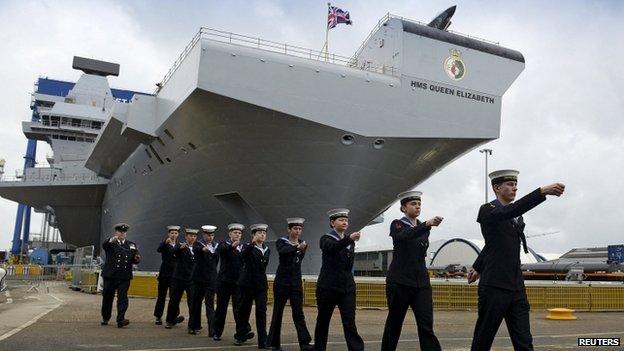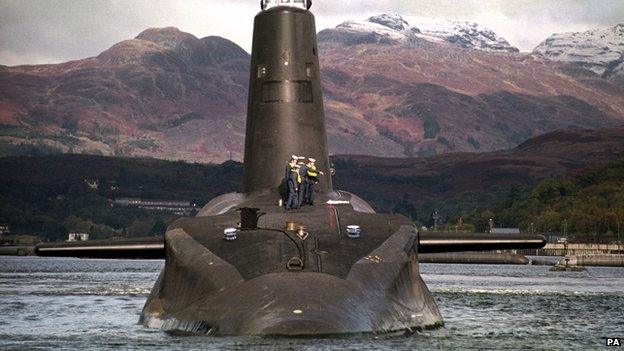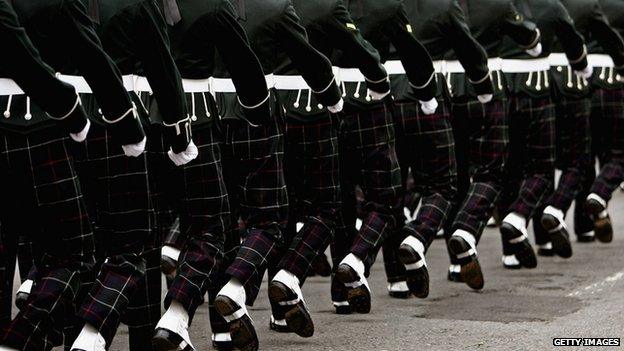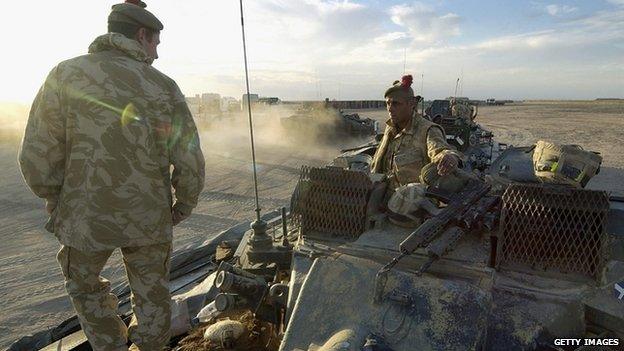Daily question: What might a Scottish defence force look like?
- Published
As the people of Scotland weigh up how to vote in the independence referendum, they are asking questions on a range of topics.
In this series, we are looking at those major questions and by using statistics, analysis and expert views shining a light on some of the possible answers.
Here, we look at what a defence force in an independent Scotland would look like.
Do you have a referendum question? Let us know by....
Emailing newsonlinescotland@bbc.co.uk.
We can also be found on Twitter @bbcscotlandnews, external
And on Facebook, external.
BBC news website users, Gavin Goodale, Colin Phillips, Bill Walker, Alan Macnaughton and Stuart Gregor all ask defence-related questions.

What does the UK already have?

The United Kingdom has one of the largest defence budgets in the world.
That brings with it...
an established worldwide reach as a nuclear power
a seat at the top table
and an ability to influence world events.
But that comes at a price - a £34bn a year price. For that the current strength of the UK military is about 148,000 in the British army, the Royal Navy and the Royal Air Force. Their 164 combat aircraft and the fleet comprises 66 ships and 11 submarines, including four Vanguard-class vessels which carry the Trident nuclear deterrent.

How might it change if independence were to happen?
Dr Phillips O'Brien answers your questions on defence in an independent Scotland.
The Scottish government wants to get rid of Trident. It also wants to take what it believes is Scotland's share of the conventional armed forces and create the Scottish Defence Force.
The White Paper, external, produced by the Holyrood administration, says it would have an annual defence budget of £2.5bn and at the point of independence it would have a land force of 3,500 troops and 1,200 reservists.
As well as artillery, engineering and medical capabilities, it would also include an aviation unit with six helicopters.
The maritime forces would include two frigates from the Royal Navy's current fleet, four mine counter measure vessels and two offshore patrol vessels.
It would also have other patrol boats and support ships and it would need 2,000 personnel and 200 reservists.
For the air force, it would have a quick reaction alert squadron of 12 Typhoon jets; a tactical transport squadron of six Hercules aircraft and a helicopter squadron. That section of the defence set up would need 2,000 personnel and 300 reservists.
The aim would be to have a total force of 15,000 personnel with 5,000 reservists across the three services after 10 years of independence.

What are the "Yes" camp saying?

The pro-independence Scottish government's Keith Brown is the minister for veterans.
On the issue of an independent Scotland's defence set up, he said: "It should be an extension of what your foreign policy and defence requirements are. So, looking after our coastline, whether its drugs or illegal entry to the country, looking after our north sea oil installations, these are very important things to Scotland.
"But it's also to play our role in international affairs and to work with our Nato partners. The UK defence forces currently train with Norwegian forces, Dutch forces, various forces around the world and I would see that continue with a Scottish defence force."

What are the "No" camp saying?

Those against independence say the consequences of a "Yes" vote would bring an end to Ministry of Defence shipbuilding in Scotland and thousands of jobs would go if Trident was removed.
The Yes campaign says contracts will still be won because of Scotland's expertise in shipbuilding and basing the HQ of the Scottish defence force would safeguard jobs at Faslane.
Pro-union Labour politician Jim Murphy is a former shadow defence secretary.
He says: "The strength of being together as part of Her Majesty's armed forces is a real bonus. On top of which you have the enormous opportunity of all the defence jobs in Scotland whether it's shipbuilding in Rosyth or on the Clyde or whether it's issues of high tech engineering all across Scotland.
"There are thousands of jobs across the Scotland that rely upon the Ministry of Defence."

In a few sentences, how can it be summed up?

What is being offered is two different visions for the future of the defence forces.
Continue as part of the UK defence forces adhering to Westminster policies, with that established world wide influence and reach, and an international standing as a nuclear power.
Or, get rid of Trident, develop a Scottish defence force at a fraction of the defence budget, a defence force purpose-built to defend an independent Scotland's interests and enforce the Scottish Parliament's will.